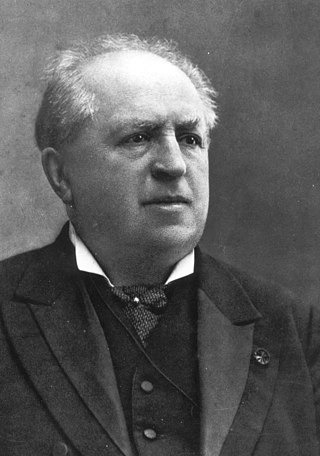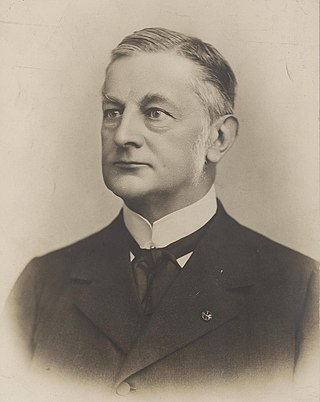| Part of the Politics series |
 |
|---|
| |
The Christian Historical Voters' League (Dutch : Christelijk Historische Kiezersbond, CHK) was a conservative protestant political party in the Netherlands.
| Part of the Politics series |
 |
|---|
| |
The Christian Historical Voters' League (Dutch : Christelijk Historische Kiezersbond, CHK) was a conservative protestant political party in the Netherlands.
The CHK was founded in 1897. [1] It was a continuation of the National Party, which was founded in 1888 but had never won a seat in parliament. They were founded as one of several parties that were founded in the 1890s, which all turned again the leadership and ideology of Abraham Kuyper, the leader of the Protestant Anti-Revolutionary Party. Kuyper had initiated a new political course for Protestantism in the Netherlands, which included cooperation with the Catholics in the Coalition, strategical support for extension of suffrage, a rejection of theocracy in favour of a specific conception of state neutrality, sphere sovereignty and a strong party organisation and party discipline.
The party was led by two Reformed ministers Bronsveld and De Visser. In the 1897 general election, De Visser was elected to the House of Representatives for the district of Rotterdam I, while Bronsveld became party chair. A conflict between the two developed, as De Visser sought for the party to cooperate with other Christian historical parties, such as the Frisian League and Free Anti Revolutionary Party (VAR), while Bronsveld did not.
In the 1901 general election, De Visser was elected for the district of Amsterdam II. In the same year, De Visser succeeded Bronsveld as chair and opened talks with the VAR. In April 1903, the VAR and the CHK merged to form the Christian Historical Party (CHP); in 1908, the CHP would in turn merge with the Frisian League to form the Christian Historical Union. [2]
The term "Christian historical" was used before 1897 to denote supporters of the main Protestant party, the Anti-Revolutionary Party, emphasising the Protestant nature of the history of the Netherlands. Furthermore, the CHK styled itself a voters' league instead of a conventional political party.
The CHK was formed as a result of dissent within the main Protestant party, the Anti-Revolutionary Party. Unlike that party, the CHK did not recognise Catholicism as a legitimate religion. The party was strongly anti-papist.
Furthermore, the party opposed universal suffrage. The party was divided over the issue of religious education, with Bronsveld advocating Protestant-inspired public education and De Visser advocating separate Protestant schools.
This table show the CHK's results in elections to the House of Representatives and Senate, as well as the party's parliamentary leader.
| Year | HoR | S | Parliamentary leader | Cabinet |
|---|---|---|---|---|
| 1897 | 1 | 0 | Johannes de Visser | opposition |
| 1898 | 1 | 0 | Johannes de Visser | opposition |
| 1899 | 1 | 0 | Johannes de Visser | opposition |
| 1900 | 1 | 0 | Johannes de Visser | opposition |
| 1901 | 1 | 0 | Johannes de Visser | supports Kuyper cabinet |
| 1902 | 1 | 0 | Johannes de Visser | supports Kuyper cabinet |
The electorate of the CHK was mainly constituted by adherents of the Dutch Reformed Church from the upper class.

The Reformed Political Party is a conservative Reformed Christian political party in the Netherlands. The SGP is the oldest political party in the Netherlands existing in its present form, and has been in opposition for its entire existence. Since 1925, it has won between 1.5% and 2.5% of the votes in general elections. Owing to its orthodox political ideals and its traditional role in the opposition, the party is considered a testimonial party.

The Anti-Revolutionary Party was a Protestant conservative and Christian democratic political party in the Netherlands. The party was founded in 1879 by Abraham Kuyper, a neo-Calvinist theologian and minister who served as Prime Minister between 1901 and 1905. In 1980 the party merged with the Catholic People's Party (KVP) and the Christian Historical Union (CHU) to form the Christian Democratic Appeal (CDA).

Abraham Kuyper was the Prime Minister of the Netherlands between 1901 and 1905, an influential neo-Calvinist pastor and a journalist. He established the Reformed Churches in the Netherlands, which upon its foundation became the second largest Reformed denomination in the country behind the state-supported Dutch Reformed Church.

The Free-thinking Democratic League was a progressive liberal political party in the Netherlands. Established in 1901, it played a relatively large role in Dutch politics, supplying one Prime Minister, Wim Schermerhorn. The League is a predecessor of two of the major Dutch political parties, the conservative liberal People's Party for Freedom and Democracy (VVD) and the social democratic Labour Party (PvdA). The social liberal Democrats 66 also claims that it and the VDB are ideologically connected.

The Christian Historical Union was a Protestant Christian democratic political party in the Netherlands. The CHU is one of the predecessors of the Christian Democratic Appeal (CDA), into which it merged in September 1980.

The General League of Roman Catholic Electoral Associations, informally called the General League, was a Catholic political party in the Netherlands. It existed from 1904 to 1926, when it was succeeded by the Roman Catholic State Party. It is one of the ancestors of today's Christian Democratic Appeal.

The Social Democratic Workers' Party was a Dutch socialist political party existing from 1894 to 1946. Originating from a split in the prior Social Democratic League, the party was a predecessor of the current social democratic Labour Party (Netherlands).

The League of Free Liberals was a Dutch classical liberal political party and a predecessor of the Liberal State Party which is historically linked to the People's Party for Freedom and Democracy, the major Dutch liberal party. The party's name League of Free Liberals was supposed to convey that the party was not a classical political party, with party discipline and a centralised organisation but a league of independent MPs. The conservative liberals were called free liberals before they had founded a separate party.

The Liberal Union was a conservative liberal and progressive liberal political party in the Netherlands. A major party in its time, the Liberals were one of the historic predecessors of the Liberal State Party, and therefore of the People's Party for Freedom and Democracy.

The Social Democratic League was a socialist political party in the Netherlands. Founded in 1881, the SDB was the first socialist party to enter the House of Representatives.

The Free Anti Revolutionary Party was a Dutch conservative Reformed political party, which existed from 1898 to 1903.

The League of electoral associations on Christian Historical foundation in the province of Friesland, informally called the Frisian League is a conservative Reformed political party in the Netherlands. The Frisian League is historically linked to the Christian Democratic Appeal, which is currently one of the major parties of the Netherlands.

The Christian Historical Party was a conservative Reformed political party in the Netherlands which existed from 1903 to 1908.

The Christian Democratic Party was a Dutch left-wing Christian-democratic political party. The CDP played only a minor role in parliament. It is historically linked to both the Labour Party and the Christian Democratic Appeal.
The Christian Social Party was a Christian socialist political party in the Netherlands. The CSP played a minor role in Dutch politics and is historically linked to the Labour Party.

This article gives an overview of Christian democracy in the Netherlands, which is also called confessionalism, including political Catholicism and Protestantism.
The school struggle is a historical conflict in the Netherlands between 1848 and 1917 over the equalization of public financing for religious schools.

Jhr. Alexander Frederik de Savornin Lohman was a Dutch politician and leader of the Christian Historical Union during the first quarter of the 20th century.

Johannes Theodoorde Visser was a Dutch preacher and politician for the Christian Historical Union (CHU). He was the Netherlands' first Minister of Education.

A process of cabinet formation took place following the Dutch general election of 14 and 27 June 1901. The formation resulted in the Kuyper cabinet on 1 August 1901. It was the second coalition cabinet, because it consisted of Catholics and the Anti-Revolutionary Party (ARP). It was further supported by the Free Anti-Revolutionary Party (VAR) and the Christian Historical Voters' League (CHK).
Parliamentary caucuses merged in 1976, and in 1977 the three parties submitted a joint electoral list under the Christian Democratic banner.